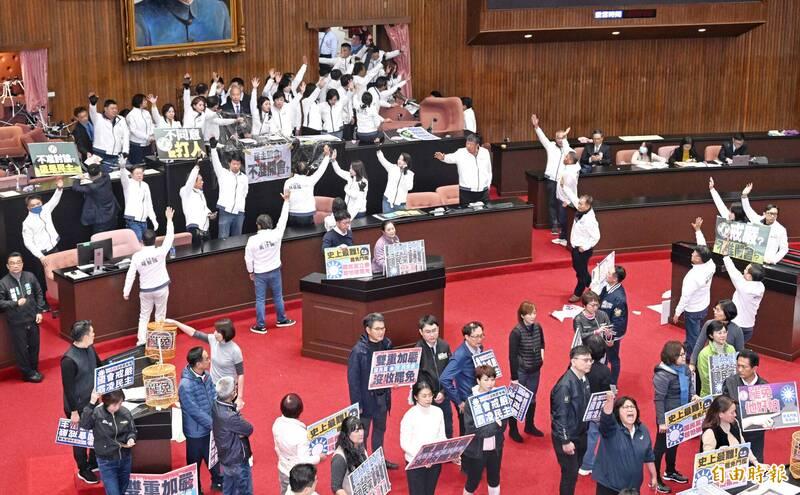The legislature today passed the third reading on amendments to the Public Officials Election and Recall Act (公職人員選舉罷免法) after physical clashes erupted in the legislative chamber this morning between ruling and opposition party legislators.
The amendments to the act require signatories of recall petitions to submit a copy of their ID card, while anyone who fraudulently uses another person’s identity to take part in a recall petition shall be sentenced to imprisonment for up to five years and/or a fine of up to NT$1,000,000 (US$30,576).
The Chinese Nationalist Party (KMT) does not even care to put on a show, Democratic Progressive Party (DPP) caucus chief executive Rosalia Wu (吳思瑤) said, adding that the KMT lawmakers had taken away the public’s power to recall officials because they are afraid to be recalled.

Photo: Fang Pin-chao, Taipei Times
Wu said the DPP was silenced during the deliberation process and did not have the chance to properly discuss the proposed amendments.
The plenary meeting today handled five articles of the act, Wu said, and 40 DPP lawmakers registered to speak about the articles.
The KMT caucus proposed that the discussion be halted after Wu made a speech, only allowing one DPP lawmaker to speak.
“No discussion, no democracy!” DDP lawmakers chanted as some of them threw water bottles at the speaker’s podium which were blocked by KMT lawmakers with acrylic boards.
Legislative Speaker Han Kuo-yu (韓國瑜), who was escorted into the chamber by KMT legislators after physical clashes erupted earlier this morning, conducted a vote by show of hands in accordance with Article 35 of the Legislative Yuan’s procedures (立法院議事規則).
Despite the DPP opposing the vote by various means, the third reading on the amendments of the act was passed as the KMT and the Taiwan People’s Party together hold the majority in the legislature.
The Ministry of the Interior expressed deep regret today that the legislature passed the third reading on amendments to the act that would raise the threshold for recall petitions without obtaining full public consensus.
Requiring petitioners to submit their ID card copies could risk leaking personal information, causing potential harm to people’s privacy and properties, the ministry said in a press release.
The amendments could discourage people from taking part in recall petitions and restrict voters’ right to recall officials, it said.

The Central Election Commission has amended election and recall regulations to require elected office candidates to provide proof that they have no Chinese citizenship, a Cabinet report said. The commission on Oct. 29 last year revised the Measures for the Permission of Family-based Residence, Long-term Residence and Settlement of People from the Mainland Area in the Taiwan Area (大陸地區人民在台灣地區依親居留長期居留或定居許可辦法), the Executive Yuan said in a report it submitted to the legislature for review. The revision requires Chinese citizens applying for permanent residency to submit notarial documents showing that they have lost their Chinese household record and have renounced — or have never

A magnitude 5.6 earthquake struck off the coast of Yilan County at 12:37pm today, with clear shaking felt across much of northern Taiwan. There were no immediate reports of damage. The epicenter of the quake was 16.9km east-southeast of Yilan County Hall offshore at a depth of 66.8km, Central Weather Administration (CWA) data showed. The maximum intensity registered at a 4 in Yilan County’s Nanao Township (南澳) on Taiwan’s seven-tier scale. Other parts of Yilan, as well as certain areas of Hualien County, Taipei, New Taipei City, Taoyuan, Hsinchu County, Taichung and Miaoli County, recorded intensities of 3. Residents of Yilan County and Taipei received

Taiwan has secured another breakthrough in fruit exports, with jujubes, dragon fruit and lychees approved for shipment to the EU, the Ministry of Agriculture said yesterday. The Animal and Plant Health Inspection Agency on Thursday received formal notification of the approval from the EU, the ministry said, adding that the decision was expected to expand Taiwanese fruit producers’ access to high-end European markets. Taiwan exported 126 tonnes of lychees last year, valued at US$1.48 million, with Japan accounting for 102 tonnes. Other export destinations included New Zealand, Hong Kong, the US and Australia, ministry data showed. Jujube exports totaled 103 tonnes, valued at

BIG SPENDERS: Foreign investors bought the most Taiwan equities since 2005, signaling confidence that an AI boom would continue to benefit chipmakers Taiwan Semiconductor Manufacturing Co’s (TSMC, 台積電) market capitalization swelled to US$2 trillion for the first time following a 4.25 percent rally in its American depositary receipts (ADR) overnight, putting the world’s biggest contract chipmaker sixth on the list of the world’s biggest companies by market capitalization, just behind Amazon.com Inc. The site CompaniesMarketcap.com ranked TSMC ahead of Saudi Aramco and Meta Platforms Inc. The Taiwanese company’s ADRs on Tuesday surged to US$385.75 on the New York Stock Exchange, as strong demand for artificial intelligence (AI) applications led to chip supply constraints and boost revenue growth to record-breaking levels. Each TSMC ADR represents